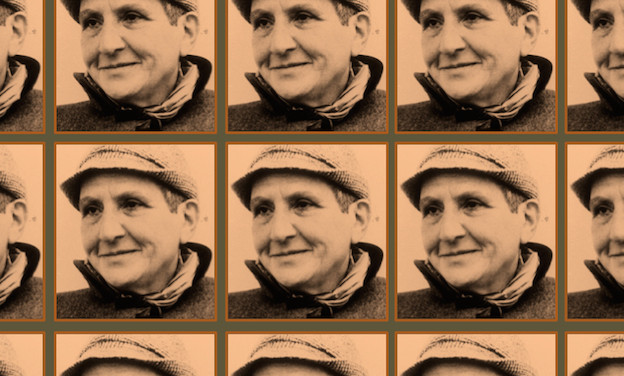Gertrude Stein's gustatory sonics

In his book on Kafka, Gilles Deleuze writes of the difficulty of both eating and speaking — one must choose, it seems, whether to ingest or express. Gertrude Stein, whose soundplay is so tongue-quickening that it always seems pronounced aloud, makes reading both speaking and eating. The “Food” poems of Tender Buttons are full of glorious, sensual mouthfeel.
In the section’s opening two poems, the grand edifices of “Roastbeef” and “Mutton” — both muscles, and so disconcerting reminders of the consuming body’s own potential consumability — draw prolonged, even elegiac responses (“in the evening there is feeling”). Further in the section, the humble daily chicken, with its comic “ick,” provokes four brief entries, as if Stein couldn’t stop repeating its rickety, abrasive sound, or curb the childlike teasing of “alas a dirty bird” and “stick stick sticking.” We are far here from the spondaic long-vowelled sonorousness of “Roastbeef,” or the schwa-muted assonance of “Mutton.” It must be mutton’s humming m that makes it so much graver than its off-rhyme, the titular Buttons with its bumping b and final z sound. When pronounced, mutton’s consonants glide smoothly, hypnotically, from that lip-buzzing m to tongue-tipping n. The mouth-movements of these sounds are near relatives to chewing.
“Food” delights in the comic oddity of what we put in our mouths, that wild diversity of shapes, sizes, and textures, and the responding oddity of what words and sounds our mouths can produce. Its range can even encompass transformations from raw product to cooked; the dynamism of writing contains the processes food is put through — raising or harvesting, cooking, digestion, absorption into the body, and eventually defecation. In the days before refrigeration, Stein would have been acutely aware of the alterations any edible object went through over time — ripening, rotting, changes in color and smell. Although she didn’t cook, it’s easy to imagine her in and out of the kitchen, curious and bemused by its ceaseless inflow and output of matter, by the malleable material in its heaps and hunks, its masses and splatters and precise julienne.
Two of the final “Food” poems are called “Salad Dressing and an Artichoke.” The formidable, sculptural whole artichoke is a very different object than the wedge or round of its “hearts” and “bottoms” (terms not used, but certainly suggestive of Buttons’ recessed emotion and eros), the forms it would be found in accompanied by a salad dressing. The prickly dactyl of a word contains both possibilities, as well as the nicked fingers, heap of discarded leaves, parings, fibers of the choke, squeeze of lemon, and bowl of acidulated water generated by the preparation. This extreme, even violent metamorphosis may be what sends her back (more mischievously) to the emotional yearning of “Roastbeef”: “please butter all the beef-steak with regular feel faces.”
“It is not what I eat that is my natural meat,” rhymed Marianne Moore in a somewhat Steinian moment. In its ranging degustations, Stein’s natural meat was what she wrote.